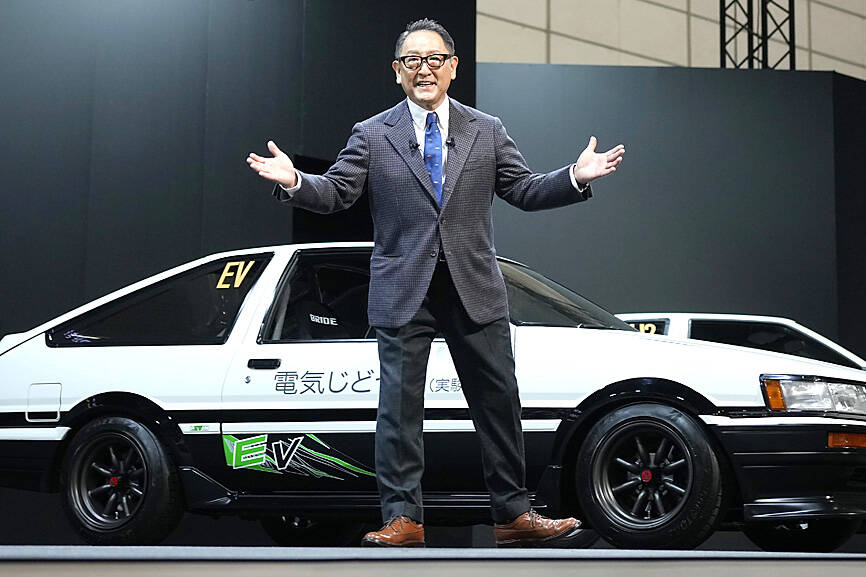Toyota Motor Corp yesterday said that Akio Toyoda would step down as president and CEO, and hand over the helm of Japan’s largest automaker at a time when the company faces the challenge of adapting to zero-carbon transportation.
Koji Sato, a 53-year-old who is also president of Toyota’s luxury brand Lexus, is to become the new CEO, the company said.
Takeshi Uchiyamada is to step down as chairman, but will remain on the board.

Photo: AP
Toyoda will become chairman in a series of changes that take effect on April 1.
The issue of who would take over from Toyoda, the 66-year-old grandson of the company’s founder, had increasingly been a focus for investors. However, the timing of the succession announcement was a surprise.
Under Toyoda, the automaker has followed a go-slow approach to electric vehicles (EVs), arguing that the hybrid technology it pioneered with the Prius would remain important along with investments in hydrogen.
That approach has prompted criticism from investors and activists who once widely praised its technology and environmental record.
Toyoda said Sato’s mission would be to transform Toyota into a “mobility company,” but did not specify what that strategy would entail.
The succession announcement was broadcast on a Web cast through the automaker’s Toyota Times channel.
Toyoda has pushed Toyota’s in-house media channel after complaining that the automaker’s message — including its strategy on hybrids — was not getting to the public.
Koji Endo, a senior analyst at SBI Securities, said the announcement of the leadership change was a “huge surprise” and Toyoda would likely remain deeply involved in operations from his position as chairman.
“The next few years could be just a kind of apprenticeship for Sato as the next president,” he said.
During his more than a decade at the top, Toyoda presided over the automaker during a period of intense change in the auto industry and rising uncertainty about how legacy automakers such as Toyota can fend off the challenge from newer — and often nimbler — challengers such as Tesla.
Toyoda told a news conference that his term at the helm of Toyota started in 2009 with “crisis after crisis” — from the effects of a global recession to Toyota’s own recall and safety crisis, to the disruption that followed the 2011 earthquake and tsunami in northern Japan.
When asked about succession planning at a shareholder meeting in June last year, Toyoda said he was “thinking about timing and the selection of a successor.”
Yesterday, he said that Sato was chosen, because he “worked hard to learn Toyota’s philosophy”.
“The CEO needs youth, energy, strength.”
Sato started his career at Toyota in 1992, before rising through the ranks to become chief engineer of Lexus International, a luxury auto brand of Toyota, in 2016, his profile on the Toyota Web site says.
He has held positions as the president of Lexus International and Gazoo Racing Co, Toyota’s motorsport brand, since 2020. He also took on an executive role at Toyota and became its chief branding officer in January 2021.

SEEKING CLARITY: Washington should not adopt measures that create uncertainties for ‘existing semiconductor investments,’ TSMC said referring to its US$165 billion in the US Taiwan Semiconductor Manufacturing Co (TSMC, 台積電) told the US that any future tariffs on Taiwanese semiconductors could reduce demand for chips and derail its pledge to increase its investment in Arizona. “New import restrictions could jeopardize current US leadership in the competitive technology industry and create uncertainties for many committed semiconductor capital projects in the US, including TSMC Arizona’s significant investment plan in Phoenix,” the chipmaker wrote in a letter to the US Department of Commerce. TSMC issued the warning in response to a solicitation for comments by the department on a possible tariff on semiconductor imports by US President Donald Trump’s

The government has launched a three-pronged strategy to attract local and international talent, aiming to position Taiwan as a new global hub following Nvidia Corp’s announcement that it has chosen Taipei as the site of its Taiwan headquarters. Nvidia cofounder and CEO Jensen Huang (黃仁勳) on Monday last week announced during his keynote speech at the Computex trade show in Taipei that the Nvidia Constellation, the company’s planned Taiwan headquarters, would be located in the Beitou-Shilin Technology Park (北投士林科技園區) in Taipei. Huang’s decision to establish a base in Taiwan is “primarily due to Taiwan’s talent pool and its strength in the semiconductor

An earnings report from semiconductor giant and artificial intelligence (AI) bellwether Nvidia Corp takes center stage for Wall Street this week, as stocks hit a speed bump of worries over US federal deficits driving up Treasury yields. US equities pulled back last week after a torrid rally, as investors turned their attention to tax and spending legislation poised to swell the US government’s US$36 trillion in debt. Long-dated US Treasury yields rose amid the fiscal worries, with the 30-year yield topping 5 percent and hitting its highest level since late 2023. Stocks were dealt another blow on Friday when US President Donald

UNCERTAINTY: Investors remain worried that trade negotiations with Washington could go poorly, given Trump’s inconsistency on tariffs in his second term, experts said The consumer confidence index this month fell for a ninth consecutive month to its lowest level in 13 months, as global trade uncertainties and tariff risks cloud Taiwan’s economic outlook, a survey released yesterday by National Central University found. The biggest decline came from the timing for stock investments, which plunged 11.82 points to 26.82, underscoring bleak investor confidence, it said. “Although the TAIEX reclaimed the 21,000-point mark after the US and China agreed to bury the hatchet for 90 days, investors remain worried that the situation would turn sour later,” said Dachrahn Wu (吳大任), director of the university’s Research Center for